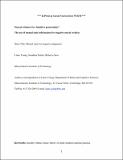| dc.contributor.author | Saxe, Rebecca R. | |
| dc.contributor.author | Scholz, Jonathan | |
| dc.contributor.author | Young, Liane | |
| dc.date.accessioned | 2012-04-13T19:34:49Z | |
| dc.date.available | 2012-04-13T19:34:49Z | |
| dc.date.issued | 2011-01 | |
| dc.identifier.issn | 1747-0919 | |
| dc.identifier.issn | 1747-0927 | |
| dc.identifier.uri | http://hdl.handle.net/1721.1/70035 | |
| dc.description.abstract | Moral judgment depends critically on theory of mind (ToM), reasoning about mental states such as beliefs and intentions. People assign blame for failed attempts to harm and offer forgiveness in the case of accidents. Here we use fMRI to investigate the role of ToM in moral judgment of harmful vs. helpful actions. Is ToM deployed differently for judgments of blame vs. praise? Participants evaluated agents who produced a harmful, helpful, or neutral outcome, based on a harmful, helpful, or neutral intention; participants made blame and praise judgments. In the right temporo-parietal junction (right TPJ), and, to a lesser extent, the left TPJ and medial prefrontal cortex, the neural response reflected an interaction between belief and outcome factors, for both blame and praise judgments: The response in these regions was highest when participants delivered a negative moral judgment, i.e., assigned blame or withheld praise, based solely on the agent's intent (attempted harm, accidental help). These results show enhanced attention to mental states for negative moral verdicts based exclusively on mental state information. | en_US |
| dc.description.sponsorship | Athinoula A. Martinos Center for Biomedical Imaging | en_US |
| dc.description.sponsorship | Simons Foundation | en_US |
| dc.description.sponsorship | National Science Foundation (U.S.) | en_US |
| dc.description.sponsorship | John Merck Scholars Program | en_US |
| dc.language.iso | en_US | |
| dc.publisher | Informa UK (Taylor & Francis) | en_US |
| dc.relation.isversionof | http://dx.doi.org/10.1080/17470919.2010.529712 | en_US |
| dc.rights | Creative Commons Attribution-Noncommercial-Share Alike 3.0 | en_US |
| dc.rights.uri | http://creativecommons.org/licenses/by-nc-sa/3.0/ | en_US |
| dc.source | Prof. Saxe | en_US |
| dc.title | Neural evidence for "intuitive prosecution": The use of mental state information for negative moral verdicts | en_US |
| dc.type | Article | en_US |
| dc.identifier.citation | Young, Liane, Jonathan Scholz, and Rebecca Saxe. “Neural Evidence for ‘intuitive Prosecution’: The Use of Mental State Information for Negative Moral Verdicts.” Social Neuroscience 6.3 (2011): 302–315. Web. 13 Apr. 2012. | en_US |
| dc.contributor.department | Massachusetts Institute of Technology. Department of Brain and Cognitive Sciences | en_US |
| dc.contributor.approver | Saxe, Rebecca R. | |
| dc.contributor.mitauthor | Saxe, Rebecca R. | |
| dc.contributor.mitauthor | Scholz, Jonathan | |
| dc.contributor.mitauthor | Young, Liane | |
| dc.relation.journal | Social Neuroscience | en_US |
| dc.eprint.version | Author's final manuscript | en_US |
| dc.type.uri | http://purl.org/eprint/type/JournalArticle | en_US |
| eprint.status | http://purl.org/eprint/status/PeerReviewed | en_US |
| dspace.orderedauthors | Young, Liane; Scholz, Jonathan; Saxe, Rebecca | en |
| dc.identifier.orcid | https://orcid.org/0000-0003-2377-1791 | |
| mit.license | OPEN_ACCESS_POLICY | en_US |
| mit.metadata.status | Complete | |
